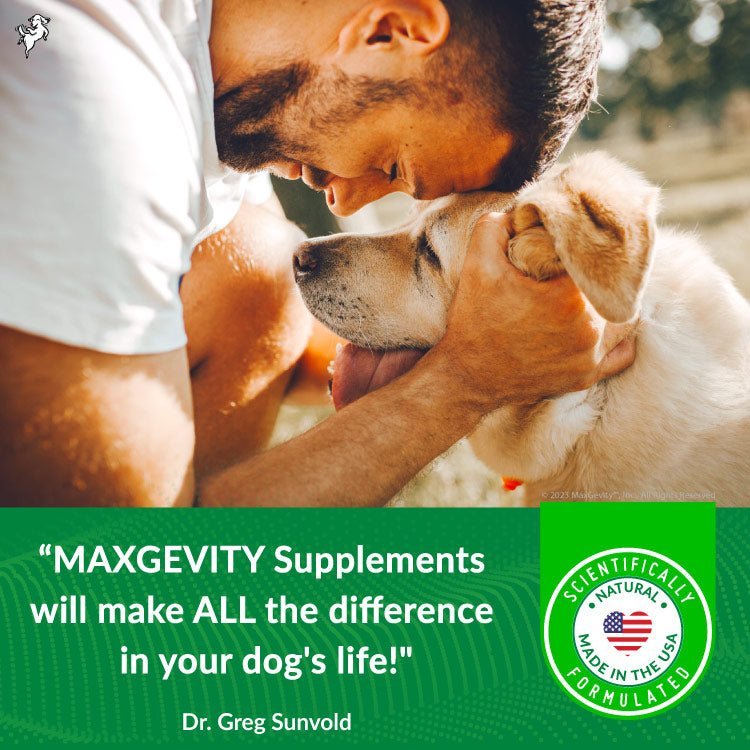
In “How to Improve Your Dog’s Health with Canine Wellness Supplements,” you’ll discover the best ways to boost your furry friend’s vitality and overall well-being using a range of dietary aids. From senior dogs needing extra joint support to young pups requiring essential nutrients for growth, this guide covers it all. You’ll learn about the benefits of incorporating natural remedies, vitamins, and probiotics into your dog’s routine, and how these supplements can enhance everything from their skin and coat to their dental health. With the help of your veterinarian, you can tailor a supplementation plan that ensures your beloved companion enjoys a long, healthy, and happy life. Have you ever wondered how to improve your dog’s health with canine wellness supplements? Whether your furry friend is a young pup, an energetic adult, or a beloved senior, their well-being is always a top priority. This article will guide you through the world of canine wellness supplements and how they can support your dog’s health.
Understanding Canine Wellness Supplements
Canine wellness supplements are specially formulated products designed to support the overall health and well-being of dogs. They can help address specific health concerns, provide essential nutrients, and support various bodily functions.
Why Should You Consider Supplements?
Just like humans, dogs have unique dietary needs that may not always be met by their regular dog food. While a balanced diet is crucial, supplements can provide additional support, particularly for certain health conditions or life stages.
Key Benefits of Canine Wellness Supplements
- Enhanced Joint Health: Ingredients like glucosamine and chondroitin support cartilage and joint health, beneficial for older dogs or breeds prone to joint issues.
- Shinier Coat and Healthier Skin: Omega-3 fatty acids, found in fish oil supplements, promote a healthy coat and skin.
- Improved Digestion: Probiotics support a healthy gut and can help with digestion and regular bowel movements.
- Stronger Immunity: Multivitamins and other supplements can boost your dog’s immune system.
Types of Canine Wellness Supplements
There are various supplements available that target different aspects of your dog’s health. Let’s break down the main types and their benefits.
Joint Health Supplements
Joint health is a common concern, particularly for senior dogs or breeds prone to hip and joint problems. Joint supplements often include glucosamine and chondroitin, which help maintain healthy cartilage and support a normal inflammatory response.
Skin and Coat Supplements
A shiny coat and healthy skin are signs of a well-nourished dog. Supplements rich in Omega-3 fatty acids, like fish oils, can greatly benefit your dog’s skin and coat. These fatty acids also help maintain healthy skin and support normal heart function.
Digestive Health Supplements
Probiotics and digestive enzymes are essential for maintaining a healthy gut. These supplements help support normal bowel movements and can be particularly beneficial for dogs experiencing digestive issues.
Multivitamins
Multivitamins provide a broad spectrum of essential nutrients that may be missing from your dog’s diet. They are formulated to support overall health and well-being, offering vitamins and minerals that help ensure optimal health.
Dental Health Supplements
Oral health is often overlooked but incredibly important. Dental supplements, including chews and water additives, help maintain healthy teeth and gums, reducing the risk of dental diseases.

Choosing the Right Supplement for Your Dog
Selecting the right supplement can be overwhelming given the multitude of options available. Here’s a step-by-step guide to help you make an informed decision.
Talk to Your Veterinarian
Before introducing any supplement into your dog’s diet, consult your veterinarian. They can offer personalized recommendations based on your dog’s age, breed, health status, and specific needs.
Look for Quality Ingredients
Choose supplements made from high-quality, natural ingredients. Products with the NASC (National Animal Supplement Council) quality seal are generally reliable, as they adhere to high standards of production.
Consider Your Dog’s Specific Needs
Identify what health aspect you want to support and choose a supplement accordingly. For example, if your dog has joint issues, look for a glucosamine and chondroitin supplement.
Read the Labels
Always read the labels to understand the supplement’s dosage instructions, ingredients, and any potential side effects. Ensure there are no fillers or artificial additives.
Popular Canine Wellness Supplements
Here are some of the most popular types of supplements and what they can do for your dog:
| Supplement Type | Key Ingredients | Benefits |
|---|---|---|
| Joint Supplements | Glucosamine, Chondroitin | Supports joint and cartilage health, ideal for older dogs |
| Skin & Coat | Omega-3 fatty acids | Promotes a healthy coat and skin, supports heart health |
| Digestive Health | Probiotics, Enzymes | Supports gut health, aids in digestion, regular bowel movements |
| Multivitamins | Various vitamins and minerals | Provides essential nutrients, supports overall health |
| Dental Health | Enzymes, herbal extracts | Maintains teeth and gum health, freshens breath |

Factors to Consider When Giving Supplements
Administering supplements to your dog requires careful consideration to ensure effectiveness and safety.
Dosage
Follow the dosage instructions provided on the supplement packaging or as directed by your veterinarian. Overdosing can cause adverse effects.
Frequency
Some supplements need to be given daily, while others may be suitable for less frequent use. Consistency is key for maximum benefit.
Monitoring Your Dog’s Health
Keep an eye on your dog’s response to the supplement. Look for improvements in the targeted health area and watch for any adverse reactions.
Common Health Concerns Addressed by Supplements
Joint Pain and Arthritis
Many dogs, especially as they age, experience joint pain and arthritis. Supplements with glucosamine and chondroitin can help manage these conditions by supporting joint health and reducing inflammation.
Skin Allergies
Dogs often react to environmental allergens, resulting in itchy skin and discomfort. Omega-3 supplements can help alleviate these symptoms by promoting skin health and natural anti-inflammatory properties.
Digestive Issues
If your dog suffers from regular digestive upsets, incorporating probiotics and digestive enzymes into their diet can provide relief and support a healthy gut.
Immune Function
A strong immune system is crucial for preventing illnesses. Multivitamins and antioxidants can enhance your dog’s immunity, helping them fight off infections and stay healthy.

The Role of Nutrition in Canine Health
Supplements are designed to complement a well-balanced diet. Ensuring your dog’s food meets their nutritional needs is vital for their overall health.
Complete and Balanced Diet
A complete and balanced diet is the foundation of good health. High-quality dog food should provide essential nutrients, but sometimes supplementation is necessary to address specific deficiencies.
Incorporating Supplements into a Diet
When adding supplements, do so gradually and ensure they complement the diet. For instance, if your dog’s food lacks sufficient Omega-3 fatty acids, a fish oil supplement may be beneficial.
Homemade Diets
If you prepare homemade meals for your dog, ensuring they receive all essential nutrients is crucial. Supplements can fill any nutritional gaps, providing peace of mind that your dog’s dietary needs are met.
Natural vs. Synthetic Supplements
The debate between natural and synthetic supplements continues, but understanding their differences can help you make informed choices.
Natural Supplements
Natural supplements are derived from whole food sources. They are often considered safer and more effective due to their bioavailability and lower risk of side effects.
Synthetic Supplements
Synthetic supplements are manufactured chemically to mimic natural nutrients. They can be more consistent in potency but may not be as easily absorbed by the body.

Maintaining Your Dog’s Overall Health
Supplements are just one aspect of a holistic approach to your dog’s health. Regular veterinary check-ups, exercise, and a balanced diet are equally crucial.
Regular Veterinary Visits
Routine check-ups allow your vet to monitor your dog’s health and catch any potential issues early. This proactive approach helps maintain optimal health and longevity.
Exercise and Mental Stimulation
Physical activity and mental stimulation are essential for your dog’s well-being. Regular exercise supports physical health, while enrichment activities keep their mind sharp.
Dental Cleanings
In addition to dental supplements, regular dental cleanings can prevent periodontal disease and other oral health issues.
Frequently Asked Questions (FAQs)
How do I know if my dog needs supplements?
Consult your veterinarian if you notice specific health concerns or if your dog has special dietary needs that their regular food doesn’t meet.
Can I give my dog human supplements?
No, human supplements are formulated differently and can contain ingredients harmful to dogs. Always use supplements specifically designed for canine consumption.
What are the signs of a supplement overdose?
Symptoms of overdose can include nausea, vomiting, diarrhea, and behavioral changes. If you suspect an overdose, contact your vet immediately.
Are there breed-specific supplements?
Some supplements are formulated to address common issues in specific breeds. For instance, larger breeds may benefit from joint supplements earlier in life due to their susceptibility to hip dysplasia.
How long does it take to see the effects of supplements?
Some benefits, like improved coat shine, may be visible within a few weeks, while others, such as joint health, may take a few months of consistent use to show improvement.

Conclusion
Enhancing your dog’s health with canine wellness supplements can provide significant benefits, from supporting joint health to improving skin condition and boosting immune function. Remember, a balanced diet and regular veterinary care are the foundation for good health, and supplements are a valuable addition to this regimen. Always consult your veterinarian to choose the best supplements tailored to your dog’s specific needs and enjoy the peace of mind that comes with supporting your companion’s optimal health and well-being.







